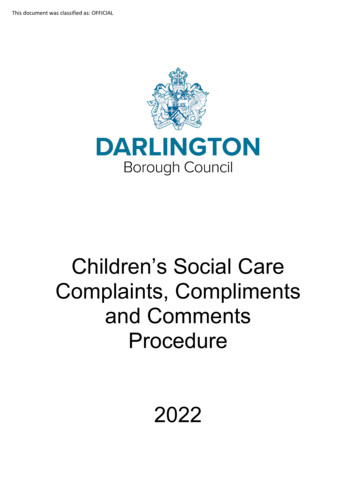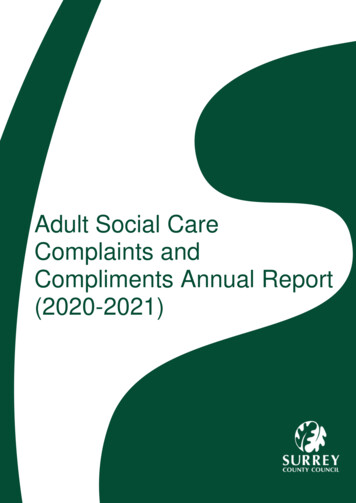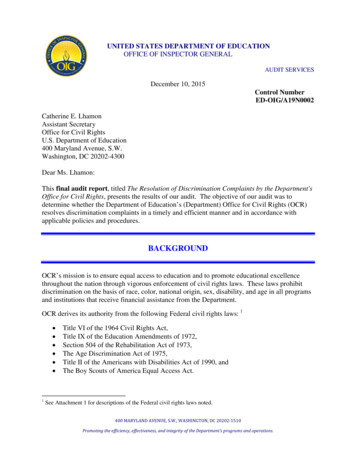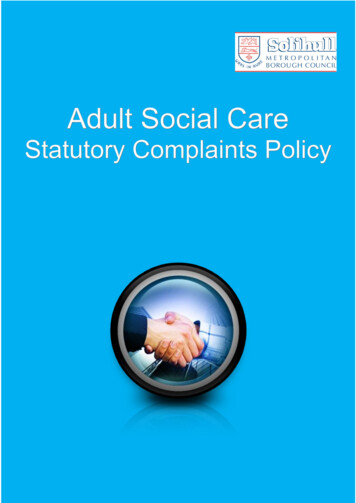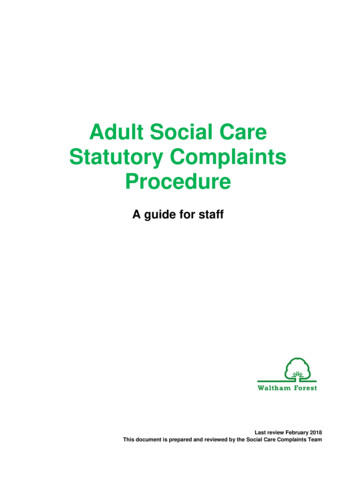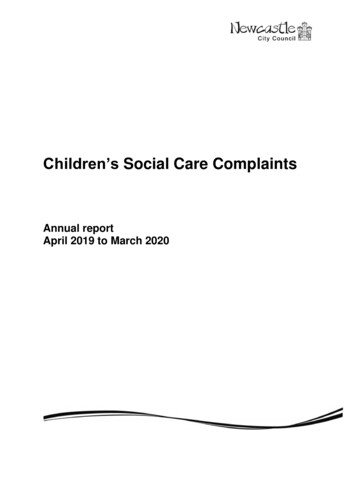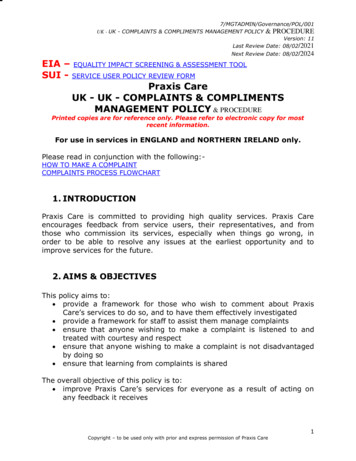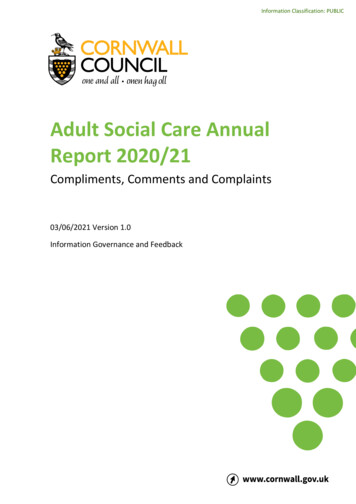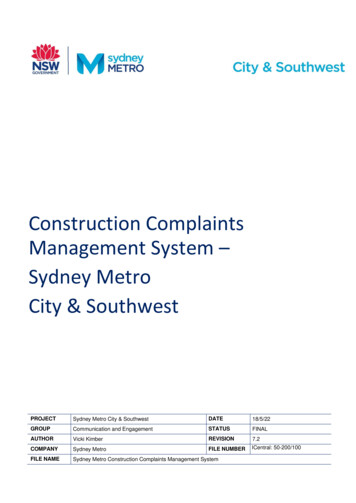
Transcription
This document was classified as: OFFICIALDARLINGTON-BOROUGH COUNCILAdult Social CareComplaints, Complimentsand CommentsAnnual Report2019/20
This document was classified as: OFFICIALContentsIntroduction3Local Government and Social Care Ombudsman (Health Services Ombudsman) 4Information and Accessibility4Advocacy4Summary5Review of the Year- Breakdown of all Representations- Total Complaints, Compliments and Comments Received 2019/20- Breakdown of Compliments by Service Area/Team- Breakdown of Complaints by Service Area/Team- Breakdown of Complaints by Issue- Complaint Outcomes- Local Government Ombudsman Complaints Received 2019/20- Local Government Ombudsman Complaint Outcomes 2019/206667810111111Organisational Learning12Further Recommendations13Performance against the Procedure13Performance Indicator for 2019/20142
This document was classified as: OFFICIALIntroductionThe purpose of this annual report is to inform service users, carers, the public, CouncilMembers and staff of the effectiveness of the Adult Social Care Complaints, Complimentsand Comments Procedure (the procedure).On the 1 April 2009 the Local Authority Social Services and National Health ServiceComplaints (England) Regulations 2009 (the regulations) came into force following theconsultation ‘Making Experiences Count’ by the Department of Health. The consultationfound that the complaints processes for people receiving both health and social careservices were overly complex and inflexible.As a result the legislation introduced altered the way in which complaints are handledintroducing a single joint complaints process for both social care and health services, withone stage as opposed to the previous three stage process used in relation to adult socialcare services. The regulations also introduced a duty for health and social care services tocooperate.The Council implemented a new procedure on the 1 April 2010 providing a local frameworkto ensure complaints are handled effectively and in line with the regulations.The procedure aims to:(a) Make it as easy and accessible as possible for service users and their carers toraise complaints;(b) Foster an organisational culture in which complaints are accepted, owned andresolved as efficiently as possible;(c) Ensure high levels of customer satisfaction with complaints handling;(d) Resolve individual issues when they arise and reduce the number of complaintsreferred to the Ombudsman; and(e) Enable the Council to identify topics and trends in relation to adult social carecomplaints and improve services as a result.The Assistant Director Adult Services is the responsible person for ensuring that theCouncil complies with the arrangements made under the regulations. They act as the‘Adjudicating Officer’, which means they make decisions on complaints and decide whataction should be taken in light of the outcome of a complaint.The Complaints and Information Governance Manager (Complaints Manager) is theresponsible person for managing the procedure for handling and considering complaints inaccordance with the agreements made under the regulations.3
This document was classified as: OFFICIALLocal Government and Social Care Ombudsman (Health ServicesOmbudsman)Although complainants can refer their complaints to the Local Government and Social CareOmbudsman (LGSCO) from the outset, the LGSCO will not normally investigate until theCouncil has conducted its own investigation and provided a response. Where it has notbeen possible for the complaint to be resolved to the satisfaction of the complainant theymay refer the matter to the LGSCO (or Health Services Ombudsman for some jointcomplaints).Information and AccessibilityWe are committed to making sure that everyone has equal access to all our services,including the complaints procedure. To help make sure the Council’s complaintsprocedures are easily accessible we have produced two leaflets (one for children andyoung people and one for adults) covering all Council services to reflect the single point ofaccess for complainants within the Council. The leaflets are available in all Councilbuildings. They have been written in line with the Plain English Campaign standards. Thetitle is written in the most commonly used community languages and it contains details onhow to access the information in other formats, for example, large print, audio and Braille.Information is available on the Council’s website. There is also an electronic form whichpeople can use to make a complaint, pay someone a compliment or pass comment onCouncil services. People may make a complaint in any format they wish. This can be inwriting, by email, via the web, over the phone, in person or by any other reasonablemeans.The Complaints Manager can arrange advocates and interpreters (including British SignLanguage interpreters) where appropriate.AdvocacyDuring 2019/20 the Council commissioned an advocacy service which provides RPRs(Relevant Persons Representatives), IMCAs (Independent Mental Capacity Advocates),IMHAs (Independent Mental Health Act Advocates), Court of Protection Advocacy, andCare Act Advocates. This is provided by Darlington association on Disability (DAD)The Council also commissioned Specialist Advocacy / Welfare Rights services for adultswith a sensory impairment, and NHS Complaints Advocacy on behalf of the NHS.4
This document was classified as: OFFICIALSummary There has been an increase in overall feedback from 99 representations in 2018/19to 134 in 2019/20. We investigated 67 complaints under the procedure during 2019/20, an increasefrom 64 in 2018/19. We received 62 compliments under the procedure during 2019/20, an increase from33 in 2018/19. We received zero comments under the procedure during 2019/20, a decrease fromtwo in 2018/19. The Council received five complaints which did not qualify for investigation underthe procedure during 2019/20, an increase from zero in 2018/19. Five adult social care complaints were progressed to the LGSCO during 2019/20, adecrease from 13 in 2018/19. The LGSCO reached a decision on six complaints during 2019/20, a decrease from14 in 2018/19.5
This document was classified as: OFFICIALReview of the YearBreakdown of all RepresentationsA total of 134 representations were handled under the procedure during 2019/20. Thisdoes not include those representations responded to directly by social care providers i.e.care homes and home (domiciliary) care providers.Total Complaints, Compliments and Comments Received 2019/2080706762605040302010There was an increase in the number of complaints we investigated, compared to 64 in2018/19.There was an increase in the number of compliments we received, compared to 33 in2018/19.There was a decrease in the number of comments we received, compared to two in2018/19.There was an increase in the number of non-qualifying complaints received, compared tozero in 2018/19.6
This document was classified as: OFFICIALBreakdown of Compliments Received by Team252020151087654OAIT Ongoing Assessment and Intervention TeamRIACT Responsive Integrated Assessment Care TeamSTAR Short Term Assessment and ReviewN.B. Those teams that do not appear in the graph did not receive any compliments during 2019/207
This document was classified as: OFFICIALBreakdown of Complaints Received by Service Area/Team181616141312121086664420431 1 I1 o'?'e" ,c'- l,IC' "?'.·t§}"" :i.'oOAIT Ongoing Assessment and Intervention TeamRIACT Responsive Integrated Assessment Care TeamSTAR Short Term Assessment and ReviewN.B. Those teams that are not listed did not receive any complaints during 2019/20.8
This document was classified as: OFFICIALCommissioning & Contracts investigated two complaints, one about a Care Home and oneabout a Home Care Agency. This was an increase from one related to a Home Care Agencyin 2018/19.Financial Assessments saw a reduction in complaints, 16 compared to 18 in 2018/19. Themost common theme was dissatisfaction with the time taken to undertake the financialassessment.There was an increase in complaints for Life Stages 26 , 13 compared to four in 2018/19.There was no common theme in the complaints received. Five of the complaints receivedwere from the same individual and concerned the conduct of their social worker. A furtherfour were from another individual regarding the support provided.There was a decrease in complaints for MCA/DOLS (Mental Capacity Act/Deprivation ofLiberty Safeguards), three compared to five in 2018/19. There was no common theme in thecomplaints received.The Mental Health Team received six complaints, an increase from five in 2018/19. Therewas no common theme in the complaints received.Occupational Therapy received four complaints, a decrease from six in 2018/19. The mostcommon theme was people’s dissatisfaction with the outcome of their assessment.Ongoing Assessment & Intervention Team (OAIT) received 12 complaints the same numberas 2018/19. The most common complaint remained people’s dissatisfaction with the outcomeof their assessment.There was one complaint for Provider Services, the same number as in 2018/19.Responsive Integrated Assessment Care Team (RIACT) received four complaints, anincrease from zero in 2018/19. There was no common theme in the complaints received.Short Term Assessment & Review Team (STAR) received six complaints, a decrease from 10in 2018/19. There most common theme was people’s dissatisfaction with the lack ofinformation provided regarding care charges.9
This document was classified as: OFFICIALBreakdown of Complaints Received by Issue25232015125I10109104I53 IThe most common cause of complaint remained dissatisfaction with a decision/assessment.In total the Council received 23 complaints about this issue, an increase from 17 in 2018/19.The second most common cause of complaint was service provision. The Council received12 complaints about service provision a decrease from 13 in 2018/19.The third most common cause of complaint was staff attitude/behavior. The Council received10 complaints about staff attitude/behavior, the same number as in 2018/19.The fourth most common cause of complaint was charges/fees. The Council received ninecomplaints about this issue, a decrease from 13 in 2018/19.10
This document was classified as: OFFICIALComplaint Outcomes57 complaint investigations were concluded during 2019/20. The outcomes of thesecomplaints are detailed in the chart below.Service Area/TeamFinancial AssessmentsLife Stages 0 – 360000110100015171731557Life Stages 26 Occupational TherapyOngoing Assessment &Intervention Team(OAIT)Short Term Assessment& Review TeamMental CapacityAct/Deprivations ofLiberty Safeguards(MCA/DOLS)Mental HealthCommissioning &Contracts – Home CareCommissioning &Contracts – Care HomeTotalLocal Government Ombudsman Complaints Received 2019/20Five adult social care complaints were progressed to the LGSCO during 2019/20, a decreasefrom 13 in 2018/19. There were no common themes in the complaints referred to theLGSCO.Local Government Ombudsman Complaint Outcomes 2019/20Five adult social care complaints were determined by the LGSCO during 2019/20, comparedto 14 in 2018/19.Full details of those complaints determined by the LGSCO are included in the Cabinet reportsof 3 December 2019 and 15 September 2020 entitled Review of Outcome of ComplaintsMade to Ombudsman.11
This document was classified as: OFFICIALOrganisational LearningAll resolution and organisational learning actions identified as a result of complaints areassigned to a responsible manager and progress against those actions is monitored by theComplaints Manager. In addition to those actions taken to resolve individual complaints, anumber of service improvements were made following complaint investigations during2019/20, some of which are detailed below.Commissioning & ContractsFollowing a complaint about a Home Care provider it was agreed the provider would ensurethat in all case where they were required to administer medication there would be clarity as towho would administer the medication. It was also agreed the provider would ensure their staffwere all aware of the company medication policy and that it was adhered to. Furthermore, itwas agreed the provider would ensure that all of their care workers are aware of how torespond appropriately in articulating to clients and families, their responsibilities in relation tothe administration of medication to prevent such misunderstandings occurring in the future.As a result of the same complaint it was agreed the provider would ensure that their supportplans accurately reflect the Council's Support Plan, and where there are discrepancies, thesewould be clarified as a matter of urgency upon acceptance of the care package. It was alsoagreed the provider needs to ensure that all of their staff are aware that they should fullycomplete all required care tasks and remain at the property for the contracted period of time.The provider agreed to review their process for recording and responding to concerns raisedby clients and their families to ensure that all concerns are documented, fully investigated andfeedback is provided to the client/family.Financial Assessment TeamFollowing a complaint regarding a financial assessment it was agreed all social workers andcommunity support officers would make it clear in assessment what level of care the personhas been assessed as needing i.e. residential standard care/residential EMI/funded nursingcare or fully health funded. The care home were also asked to ensure that families are awarethat residents can be given EMI residential enhanced care on both the first and second floorof the home as families must know what level of care their family member is receiving at anytime within their care journey.Mental Capacity Act/Deprivations of Liberty Safeguards (MCA/DOLS)Following a complaint Safeguarding Adult Managers were reminded of the timescales forcompleting Safeguarding Initial Enquiries and that if new information comes to light during theinitial enquiries this must be passed on to relevant professionals to investigate.12
This document was classified as: OFFICIALOngoing Assessment & Intervention Team (OAIT)Following a complaint for OAIT it was agreed the social worker would repeat the Council’sData Protection training. It was also agreed social workers would ensure people with aLasting Power of Attorney are given information and that if they do not respond to telephonecalls and messages social workers would write to them to ensure they are fully informed at alltimes.Short Term Assessment & Review Team (STAR)Following a complaint for the STAR Team all staff were briefed on the importance of sharinginformation in relation to Financial Assessments, directed to the policy and advised to providecopies of the information leaflet to all new clients and clients with a change in need i.e.moving from domiciliary support to residential. It was also agreed managers would ensuresocial workers discuss and record charging implications for the individual with them and/ortheir financial agent and leave documentation following assessment so they can refer to thisfor recall of the visit. The Council also committed to reviewing the “Making a contribution”section of the assessment on Liquid Logic (the Council’s electronic social care recordsmanagement system).Occupational TherapyFollowing a complaint for Occupational Therapy it was agreed a clearer process was requiredfor the authorisation of Disabled Facilities Grants and noted an interim process was in placewhile the policy was being reviewed/updated. It was also agreed staff would be provided withinformation in relation to Disability Related Expenditure and application of mobility benefits.Further recommendationsAdult Services should ensure complaints are responded to in a timely manner and that wherean extension is required this is communicated to the complainant and properly recorded.Performance against the ProcedureThe target for acknowledging receipt of complaints under the procedure is 3 working days.93.94% of complaints received during 2019/20 were acknowledged within the 3 working daytimescale, an increase from 69.4% in 2018/19.There are no longer any statutory timescales for complaint responses, except thatcomplainants should receive a response within six months. The procedure sets out atimescale for dealing with complaints solely about the Council’s services i.e. 30 working days,although there are circumstances in which the investigator may agree an extension with thecomplainant. It also states that for joint health and social care complaints the complaintsmanagers from the different organisations will work together to decide a reasonable timescale13
This document was classified as: OFFICIALand agree this with the complainant. This is to ensure investigations are completed in atimely manner and within the maximum time allowed.Seven complaints exceeded the maximum six month time limit, a reduction from 12 in2018/19.Performance Indicator for 2018/19In relation to adult social care complaints the Council’s key performance indicator is thenumber of maladministration decisions received from the Local Government and Social CareOmbudsman. The Council received five maladministration decisions during 2019/20,compared to nine during 2018/19.Full details of those complaints determined by the Local Government and Social CareOmbudsman are included in the Cabinet reports of 3 December 2019 and 15 September2020 entitled Review of Outcome of Complaints Made to Ombudsman.14
The Council received five complaints which did not qualify for investigation under the procedure during 2019/20, an increase from zero in 2018/19. Five adult social care complaints were progressed to the LGSCO during 2019/20, a decrease from 13 in 2018/19. The LGSCO reached a decision on six complaints during 2019/20, a decrease from
